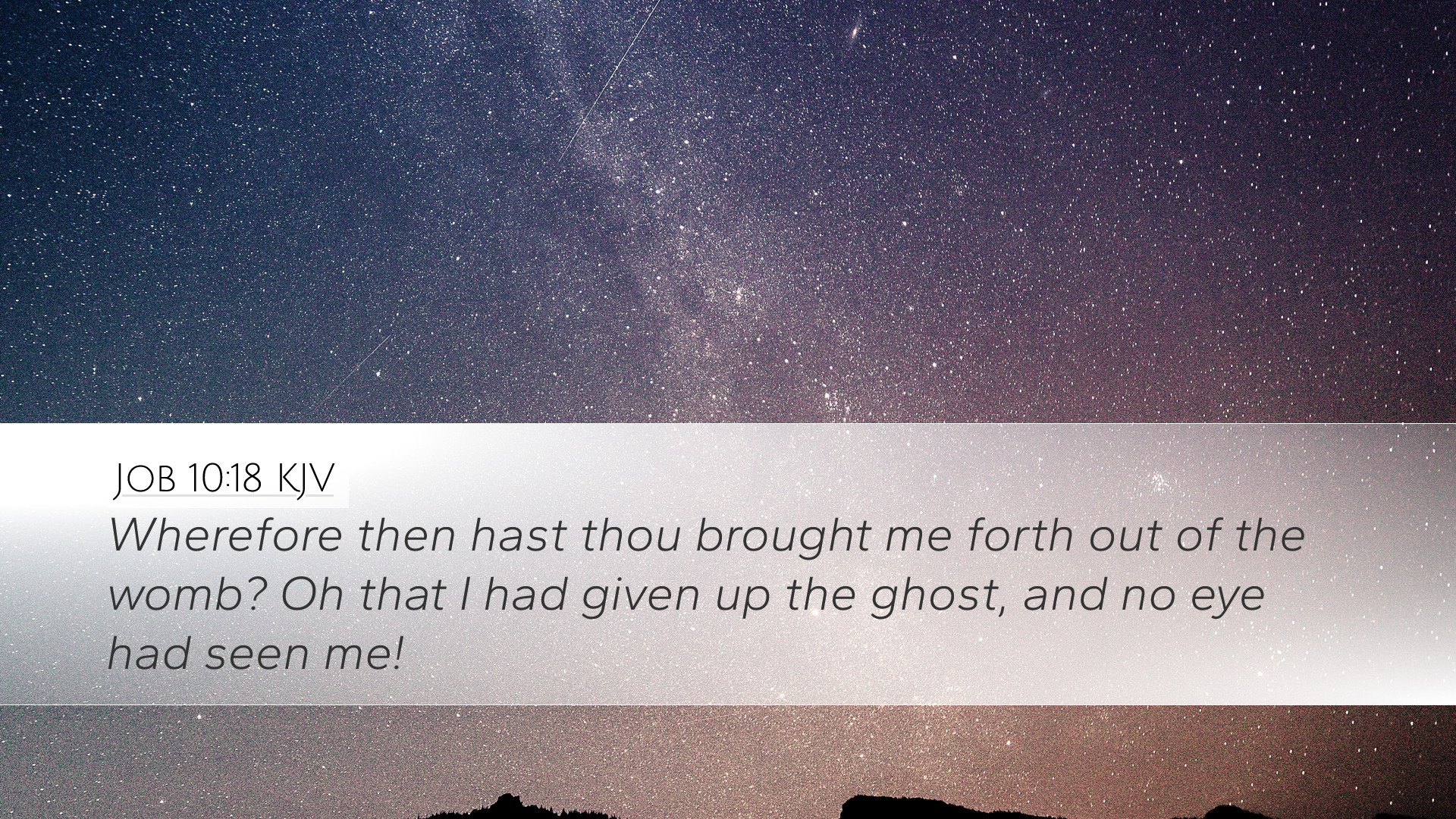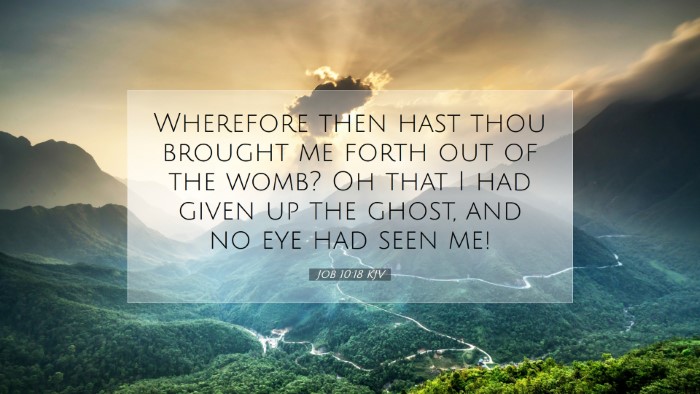Old Testament
Genesis Exodus Leviticus Numbers Deuteronomy Joshua Judges Ruth 1 Samuel 2 Samuel 1 Kings 2 Kings 1 Chronicles 2 Chronicles Ezra Nehemiah Esther Job Psalms Proverbs Ecclesiastes Song of Solomon Isaiah Jeremiah Lamentations Ezekiel Daniel Hosea Joel Amos Obadiah Jonah Micah Nahum Habakkuk Zephaniah Haggai Zechariah MalachiJob 10:18
Job 10:18 KJV
Wherefore then hast thou brought me forth out of the womb? Oh that I had given up the ghost, and no eye had seen me!
Job 10:18 Bible Commentary
Commentary on Job 10:18
The verse Job 10:18 states: "Why then did You bring me out of the womb? Oh, that I had never been born, or had died at birth!" This passage captures the profound struggle of Job as he grapples with his existence and the suffering he endures. Several public domain commentaries provide valuable insights into the meaning and implications of this verse.
Contextual Overview
Job, a man of great integrity, faces immense suffering and loss. His lament in this verse reflects not just personal despair but also deep theological questions about God's justice and the purpose of human life. The context of Job's affliction and his ongoing dialogue with God and his friends set the stage for an exploration of these themes.
Matthew Henry’s Commentary
Henry emphasizes the emotional intensity of Job's words. He interprets this lament as a moment of deep questioning; Job is overwhelmed by his suffering and seeks to understand why God would allow him to be born only to experience such anguish. Henry notes:
- Existential Dread: Job expresses a profound sense of dread at the thought of his existence. If life is filled with pain, what value is there in being born?
- The Burden of Life: Henry suggests that Job's speech reveals the heavy burden of life itself, especially when faced with emotional and physical torment.
- God’s Sovereignty: The commentary highlights that Job's earnest questioning reflects the struggle to reconcile human suffering with the belief in a sovereign and good God.
Albert Barnes’ Notes
Barnes offers a more theological reflection on Job's lament, considering the implications for understanding suffering. He states:
- Questioning Divine Intent: Job’s question, “Why then did You bring me out of the womb?” encapsulates the human tendency to question divine purposes in light of suffering.
- Value of Life: Barnes argues that Job's yearning for non-existence expresses a deep-seated pain that leads to questioning the worth of life when it is filled with distress.
- Hope Amidst Despair: While the verse explores deep despair, Barnes subtly suggests that within this questioning may lie the seeds of hope, hinting at Job's ultimate restoration.
Adam Clarke’s Commentary
Clarke provides a scholarly evaluation of Job's emotional state, and notes that this verse reveals the acute anguish and frustration that many believers face in moments of trial:
- Sense of Abandonment: Clarke notes that Job feels abandoned by God, which echoes the sentiments of many who suffer unjustly.
- Philosophical Reflection: Job’s lament can signify a philosophical reflection on the nature of existence and suffering, resonating within the lives of those who endure trials.
- Theological Implications: It prompts theological inquiries regarding God's involvement in creation and the fate of humanity, further engaging the readers in the larger narrative of suffering in the Scriptures.
The Importance of Suffering
Drawing insights from these commentaries, it becomes evident that suffering is a critical theme in the Book of Job and the wider Biblical narrative. The question of why individuals endure pain and loss is one that resonates deeply. Numerous Biblical scholars argue:
- Suffering as a Teacher: While profound pain is difficult, it can serve as a teacher, revealing deeper truths about humanity and our relationship with God.
- The Impermanence of Life: Life’s temporary nature necessitates reflection on its value, prompting both individuals and communities to consider their spiritual journeys.
- Ultimately Pointing to Redemption: Christian theology interprets elements of suffering through the lens of redemptive history, culminating in the life and resurrection of Jesus Christ.
Conclusion
In Job 10:18, we find a potent mixture of anguish, existential questioning, and profound theological implications. Each commentary from Henry, Barnes, and Clarke contributes depth to our understanding of Job’s lament. For pastors, students, theologians, and Bible scholars alike, exploring this verse encourages an honest engagement with the complexities of suffering, mirrors humanity’s darkest moments, and ultimately leads toward hope in God’s redemptive plan.


